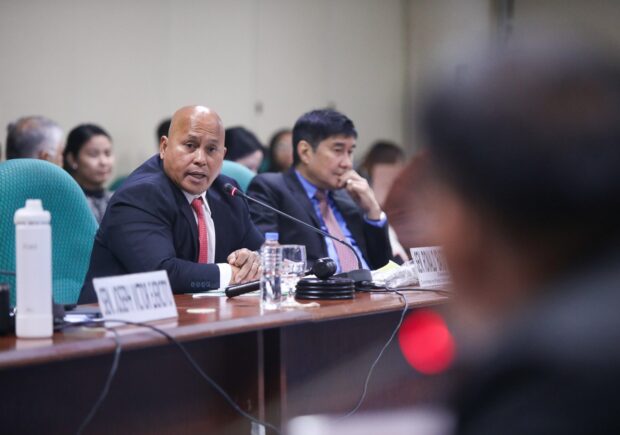
BUILDING INCLUSIVE, EQUITABLE SOCIETY FOR PERYA AND SECURITY INDUSTRY: Sen. Ronald “Bato” Dela Rosa presides over the public hearing of the Committee on Public Order and Dangerous Drugs Tuesday, February 6, 2024. Bibo Nueva España / Senate PRIB
MANILA, Philippines — Members of the Perya Industry of the Philippines Association (PIPA) Inc. sought the Senate’s help over alleged “relentless harassment” perpetrated by law enforcement officers against them.
In a position paper read during the Senate’s Tuesday hearing, PIPA explained that Perya — known as a carnival in English – is a popular entertainment in the Philippines during town fiestas and celebrations.
“Perya is an establishment where people, especially children and young people, go to enjoy a variety of activities such as rides, games, and shows. However, unlike other business entities, peryahan operates in a specific locality for four to six hours daily within a span of a few months as specified in the permit issued by the local government units,” the position paper reads.
PIPA, however, claimed that law enforcement as well as some media men, do not recognize the legality of the permit issued by local government units.
With this, PIPA said that the number of the organization’s bonafide members dwindled in recent years. Among the reasons for this decline is the fact that most of them could no longer afford “non-operating expenses” resulting from alleged extortion.
“While perya owners are authorized by local government units to operate in their area, police officers do not respect such authority. Harassment is inflicted upon perya workers. Police officers, media men, and other enforcement agency personnel extort money from the owners,” said PIPA.
In the same hearing, two PIPA team leaders testified that they were indeed harassed by law enforcers. One claimed that his family was forced by an individual, going by an alias Ruben, to sell cigarettes.
Another team leader, this time hailing from Batangas, said the carnival they are operating was ransacked by a police officer and pocketed all their earnings.
PIPA President Evelyn Mendoza likewise alleged that some “bagmen” harassing them usually force people in the perya industry to pay their weekly “S.O.P” or grease money, otherwise their operations will be halted.
In view of this, PIPA appealed to Senator Ronald “Bato” dela Rosa’s committee on public order and dangerous drugs to provide safeguards to the perya industry. This, according to the organization, will be made possible by granting the following:
- Allow perya operators to conduct their activities anywhere in the land without impediment
- Recognize the perya trade as lawful
- Designate the LGU as the sole authority that will regulate the operations of the perya industry
- Provide a transient economic zone exclusive for PIPA members to promote the economic development program of the country
The former top cop turned lawmaker Dela Rosa, who was presiding over the hearing as committee chair, maintained that law enforcers wouldn’t have the reason to just arrest them if workers aren’t doing anything wrong.
“Para mabalik ang dignidad huwag kayong magpahuli. Para hindi kayo hulihin, huwag kayong magpalaro ng illegal gambling, ganon lang ‘yun kasimple. You will never be harassed kapag walang rason to harass you.
(To restore dignity, don’t be caught. So that you don’t get caught, don’t enforce illegal games, it’s that simple. You will never be harassed when there is no reason to harass you.)
Senator Bong Go, who was also present in the hearing, backed dela Rosa’s statement and said he finds it hard to believe that police personnel will be able to commit these acts.
“Lalo na itong mga pulis natin. Kaya hindi kami basta-bastang maniwala rin na sila ay involved dito. Dahil noong una noong 2018, dinoble ni dating Pangulong Duterte ang sweldo nila. Wala pong rason na mangikil ang mga ito dyan sa maliit na kita,” said Go.
(Especially our police officers. So we can’t just believe that they are involved here. Because earlier in 2018, former President Rodrigo Duterte doubled their salary. There is no reason for them to extort that little income.)
“The important thing here is how the regulation and the law can be implemented and the government can make money and at the same time our small workers get paid,” he added, partly in Filipino.